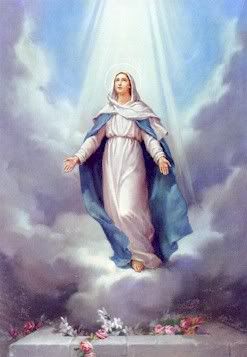 As has become their wont, most of the U.S. Catholic bishops are not requiring the faithful to attend Mass today. After all, the Feast of the Assumption of Mary falls on a Monday this year; going to church two days' running is apparently too onerously ascetical for contemporary Americans with cars. And we wonder why there's been a sex scandal among priests? Why the rates of divorce and abortion among Catholics roughly matches that of the general population? I'm no saint either, but that's precisely why I'm going to Mass today. As I age and meditate on the truths of my faith, I am more and more awestruck by the Mother of God and want a little of her to rub off on me. And there's something about this feast which attracts even some secular thinkers.
As has become their wont, most of the U.S. Catholic bishops are not requiring the faithful to attend Mass today. After all, the Feast of the Assumption of Mary falls on a Monday this year; going to church two days' running is apparently too onerously ascetical for contemporary Americans with cars. And we wonder why there's been a sex scandal among priests? Why the rates of divorce and abortion among Catholics roughly matches that of the general population? I'm no saint either, but that's precisely why I'm going to Mass today. As I age and meditate on the truths of my faith, I am more and more awestruck by the Mother of God and want a little of her to rub off on me. And there's something about this feast which attracts even some secular thinkers.The great psychologist Carl Jung, for example, regarded Pope Pius XII's bull Munificentissimus Deus, defining the Assumption as a dogma of the Church, as the most important spiritual event since the Protestant Reformation. Thus:
The logic of the papal declaration cannot be surpassed, and it leaves Protestantism with the odium of being nothing more but a man’s religion which allows no metaphysical representation of woman. In this respect it is similar to Mithraism, and Mithraisim found this prejudice very much to its detriment. Protestantism has obviously not given sufficient attention to the signs of the times which point to the equality of women. But this equality requires to be metaphysically anchored in the figure of "divine" woman, the bride of Christ. Just as the person of Christ cannot be replaced by an organization, so the bride cannot, be replaced by the Church. The feminine, like the masculine, demands an equally personal representation (Answer to Job [Routledge & Kegan Paul, London, 1954], pp. 170-71).
As Jung realized, the proclamation of this dogma heralded the rise of the feminine in modern Western culture by emphasizing that it is a woman who is, par excellence, what each of the faithful is called to become. What's more, I've often wondered why women almost always outnumber men in church settings. Having pondered Jung's words, I think it's just because the feminine in each of us is more apt to receive the man Jesus Christ into our hearts. In a sense, we are all feminine to God's masculine.
Satan, leader of all who rebel against God, is both frightened and shamed by the Queen of Heaven. That's all the more reason to attach ourselves to her.




























